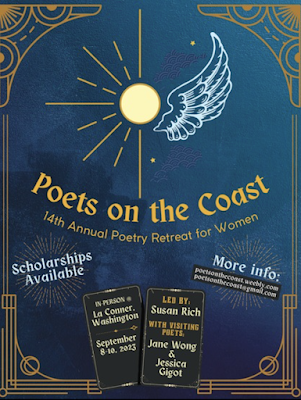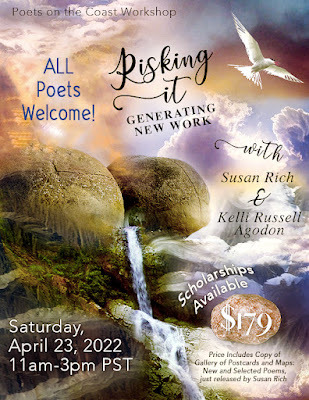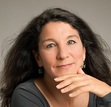Susan Rich's Blog
March 28, 2023
Denise Levertov in Blue Jeans
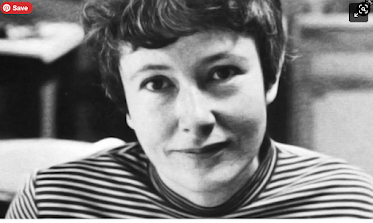
I didn't have my driver's license yet, but I convinced a friend who did to take me to Brandeis University to hear the poet, Denise Levertov. I had read some of her poems and all of her book, The Poet in the World. I can still see that cover. Wait! I still have my copy with my name and the date, 1975, written in my best cursive. Almost 50 years later I am still rereading and underlining this same book.
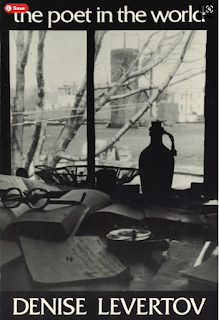
In 1975, I was 15 years old, what did I know? But I bought myself this book($2.45) with my babysitting money and clutched it tightly. I desperately wanted to be a poet in the world; I didn't know how to go about it but this was my deepest desire.
Denise Levertov seemed an actual embodiment of the world I wanted to know. She was born in England, and had grown up there, moved to New York City, her family was originally Jewish ( a long legacy of honored rabbis) but her father had converted to Christianity. Most of all, she was a respected poet with poems and essays that astonished me.
In-person, Levertov was more spirit than flesh. The reading was in a nondescript Brandeis classroom and she sat on a small desk, her legs criss-crossed. And yes, she wore jeans, blue Levis (what else existed?) and a casual shirt. I admit, this (at the time) unheard of attire made a lasting impression.
I didn't understand how a famous poet (she had 8 books already) could be so unassuming. No auditorium, no crowd, just a weekday afternoon gathering of likeminded people. I hope she read what was my favorite of her poems, "The Secret." It seemed written just for me...and every other young woman I knew.
The Secret
Two girls discover
the secret of life
in a sudden line of
poetry.
I who don’t know the
secret wrote
the line. They
told me
(through a third person)
they had found it
but not what it was
not even
what line it was. No doubt
by now, more than a week
later, they have forgotten
the secret,
the line, the name of
the poem. I love them
for finding what
I can’t find,
and for loving me
for the line I wrote,
and for forgetting it
so that
a thousand times, till death
finds them, they may
discover it again, in other
lines
in other
happenings. And for
wanting to know it,
for
assuming there is
such a secret, yes,
for that
most of all.
BY DENISE LEVERTOV
Yes! That time when a line of poetry can change your life one week and then be forgotten the next. But this poem, with its tight line breaks and quatrains, imprinted itself into my poetry DNA. As did this one:
Central Park, Winter, After Sunset
Below the
darkening fading
rose
(to which, straining
upward, black
branches address them-
selves, clowns of alas)
the lights
in multitudinous
windows
are
bells in Java
A sense
of festival
but
somewhere far-off;
sounds from
over water
the frosty field un-
dulates from
Holland to Mexico:
space, or
space as dreams
dissolve it.
This one still feels mysterious; a little less so knowing that Levertov spent time living for short stints in Holland and Mexico. Her line breaks, at the time, were revolutionary as much of her work had to do with her "organic form."
As I grew older I understood that Denise Levertov, Muriel Rukeyser, and Adrienne Rich all went to Vietnam to advocate for peace as citizen poets. And later still, that she was a complicated poet in that she seemed blind to issues of gender and was know to be homophobic (see Kate Daniel's review of two Levertov biographies at the Wellesley Center for Women).
When I taught in the Antioch MFA program in Los Angeles, I'd teach a course called "Courting Your Dead Mentor," which was premised on how much easier it was to love a dead poet who you could study after the fact. Reading the books of poems, the critical essays, and the inevitable biographies was a "cleaner" way to approach the poets we admire. I assumed they were less likely to disappoint us from the afterlife.
How I wanted my poets to be heroic! Yet, Rilke abandoned his family and fell in love with his wife's best friend; Bishop had two lovers who committed suicide (bad luck?) and the male poets who taught me as an undergraduate would exchange one student lover for another on a regular basis.
And yet.
I want to return to that time when poets were not "professionals." "You don't choose poetry, poetry chooses you," is how Linda Pastan phrased it. I want to time travel back to when I believe poets were the best people on the planet. I want to believe that we are as good as our words.
February 26, 2023
Eavan Boland with Mixed Emotions
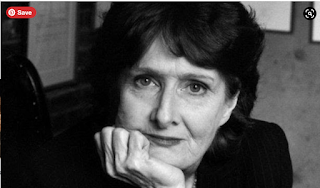
What I remember: Inside the library and all the way to the auditorium, security guards and tall men in suits lined the corridors. At a poetry reading? The evening's playbill, handed to us by beaming librarians, announced that the Irish Consul was going to be introducing Boland. The entire event had the feel of an official state dinner---but without the food and drink.
What we didn't know at the time was that Boland's father had been Ireland's first Ambassador to Great Britain, and later, to the United Nations. That Eavan Boland's classmate was Mary Robinson, President of Ireland. Perhaps this had something to do with the formality (and sellout crowd) of the event or perhaps Bostonians simply adore anything Irish. In either case, I remember feeling every bit the gate crasher.
However, none of this mattered when Eavan Boland took the stage. Actually, she commanded the stage from her military posture to her no nonsense approach to her poems. I believe she might have referred to herself in the third person. It was as if Eavan Boland was performing a lecture on Eavan Boland.
The launch of her book Outside History: Selected Poems 1980-1990 (Norton) must have been the impetus behind the event. Boland was not yet fifty and little known in this country. That would soon change. In the following years, Norton would continue to be Boland's publisher and she'd take-up the position of Director of Creative Writing at Stanford University. But none of this had happened yet.
Instead, I remember a radiance to the poems which I instinctively responded to; sounds that invited me into a world of women where breastfeeding a child in the middle of the night or looking out the window were valued poetic subjects. It's impossible to relay the shock of the new; the radically feminist edge her work represented at the time---despite the upperclass bias, despite the ice cold presentation, these poems were announcing something important and wonderful in poetry.
 To finish reading "Ode to Suburbia," click here.
To finish reading "Ode to Suburbia," click here.And perhaps because she was so outrageously upperclass (with seemingly no political awareness of her position) her work was not ignored. At 23, she was one of the youngest lecturers at Trinity College, Dublin; today she is regarded as "the first major woman poet to write in the Irish tradition," (Gelpi, A, Stanford Magazine).
There seem to be too many Eavan Boland's in the poems and in life for me to consider in such a short space. Dear Reader, I was in love with the early poems, I was not in love with the person. And yet. Perhaps to write herself into the canon meant leaving a certain openness, a certain kind-heartedness behind.
Can we love the poems and not the poet?
Here is an excerpt from "Anna Liffy" written, in part, to the river that runs through Dublin with its 13 tributaries.
*
"Maker of
Places, remembrances,
Narrate such fragments for me:
One body. One spirit.
One place. One name.
The city where I was born.
The river that runs through it.
The nation which eludes me.
Fractions of a life
It has taken me a lifetime
To claim.
I came here in a cold winter.
I had no children. No country.
I did not know the name for my own life."
*
To read all 13 sections of the poem click here (Boland later took the section markers out---and made many post-publication edits).
****
And in one of the strange/not-so-strange coincidences in life: Linda Pastan blurbed Boland's first US publication, Outside History Selected Poems (1980-1990) like this:
'Eavan Boland's poems have been appearing here and there, tantalizing us with their rich, evocative music, the wisdom of their "camomile glow." What a pleasure to have them gathered together here where they can reach the large American audience they so clearly deserve."
February 11, 2023
Elizabeth Bishop: A Couple of Facts and Some Fabulousness

I just adore this photograph of Elizabeth Bishop in Brazil road-tripping with Minnow, her tuxedo cat.
This week was Elizabeth Bishop's birthday, she would have been 112 on February 8th. Happy Birthday, Miss Bishop! Although we both lived in the Boston, and our times overlapped a little, I was 10 years old when she died, quite suddenly, at the age of 68 of a cerebral aneurysm in her home on Lewis Wharf which was right on the Boston waterfront and newly renovated. Miss Bishop had very refined tastes!
Here's a story about her I love and that has never been told in print as far as I know. I was saving it for the book on my poetry mentors that I may or may not get around to writing.
When I first moved to Seattle (where Bishop also lived for a short time) I was invited to teach a one night class at the Elliott Bay Book Company, the most beloved bookstore in my adopted city, then and now. I was young(er) and felt perfectly fine teaching Bishop's work to whomever showed-up. It was very informal, a weekday evening----more an appreciation of some poems than an academic class. One woman in a fur coat, and her friend were clearly retirees and thrilled to be in a small circle discussing poems (there were also University of Washington students clearly there for extra credit).
As the evening wrapped-up, the woman in fur came up to me and let me know that she, too, came from Boston. "I have a gift for you," she said excitedly, In fact, this woman had a close friend that had lived just underneath Bishop's condominium on Lewis Wharf. Her friend was not exactly a fan of Bishop-the-neighbor and this is why: one night Bishop was planning a dinner party and she came down to knock on her neighbor's door. Bishop wanted to know if she could borrow the neighbor's dog, a Pekingese. Bishop told the woman's friend that the dog's face looked exactly like a pansy and she wanted her friends to see the striking resemblance.
The woman's friend was not the least bit amused. "She didn't invite me to the party, only my dog," the neighbor said. And yes, it was rude and perhaps unkind to want to borrow a neighbor's beloved pet to be a party favor but it also seems so quintessentially Bishop: to carefully observe one thing and see another. The woman in the fur coat smiled broadly and disappeared into the night.
I believe I've read every book about Elizabeth Bishop's life and work. At this point I know the narrative of her life as if it were my own: the death of her father, followed by her mother's being sent to a psychiatric hospital (never to return), Bishop's dislocation between sets of grandparents, her meeting Marianne Moore just after college, a trip to Brazil and intense allergic reaction to the fruit of a cashew. Her lifelong alcoholism; her many lovers --- including the assistant secretary in the English department at the University of Washington---with whom Bishop moved to San Francisco with....and then disastrously to Brazil...but that's another story.
Somewhere, in all that reading I came across this little known fact: Elizabeth Bishop always kept a compass in her pocket. (If you know where I read this please, let me know!) I found this fact revelatory. Bishop wrote about her love of binoculars and this seemed to offer a sense of continuity in the image I had formed of her: birdwatcher, traveler, watercolorist --- and brilliant poet. I had tried writing about her before but this "little-known fact" somehow was the portal I needed.
If you are a poet, and if you love Bishop, there's a good chance you are one; I offer this suggestion: find an obscure fact about a poet you admire and see if the object can open a doorway into a new poem for you.
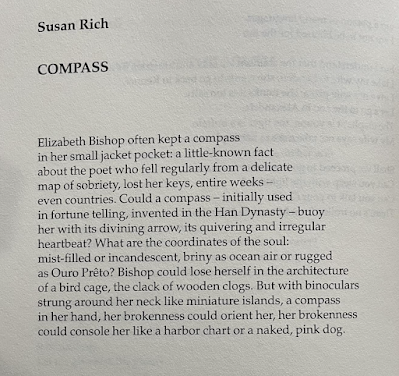 Thank you to the Alaska Quarterly Review for publication of this poem.
Thank you to the Alaska Quarterly Review for publication of this poem.
February 4, 2023
Linda Pastan (1932 - 2023)
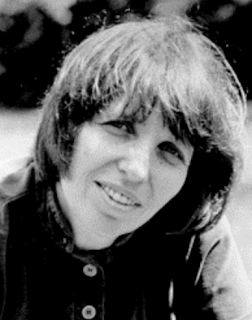 I am still in shock that Linda Pastan has died. I liked knowing she was in the world. We first met when I was sixteen and she visited my high school library to give a poetry reading.
I am still in shock that Linda Pastan has died. I liked knowing she was in the world. We first met when I was sixteen and she visited my high school library to give a poetry reading. Twenty years later we met again at the Bread Loaf Writers Conference. She was the one that suggested I return to graduate study for an MFA. As she hugged me goodbye at the end of the two weeks, she asked me to keep in touch with her so she could follow my career. I looked over my shoulder sure she must be speaking to someone else. As a creating writing professor now myself, I'm stunned by how much power that one sentence had to change my life. And yes, reader, we did stay in touch. I last saw her when she came out to Seattle with her husband for a reading.
Recently, as in a few weeks ago, we had been emailing about her essay,"More of the Sum of Its Parts," which she wrote for an anthology Kelli Russell Agodon and I coedited: Demystifying the Manuscript: Essays and Interviews on Creating a Book of Poems (Two Sylvias Press, 2023).
Two weeks ago I wrote a blogpost highlighting Linda's work because I didn't believe her poems are as well known as they deserve. I wonder if her death will bring a temporary spotlight to her work.
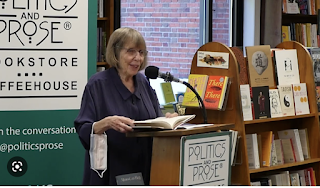 Linda Pastan reading from Not an Elegy this past November at 90 years old.
Linda Pastan reading from Not an Elegy this past November at 90 years old.Since her death, I've done a deep dive into her 15 books and watched her on several YouTube videos. There's two videos I keep playing over and over. The first is a thirty year old archival piece where Lucille Clifton interviews Linda Pastan for a local television show. Such sweetness. The understated way they talk about their work, barely looking at each other or at the camera. Pastan mostly looks down at her shoes. However, it's clear that the women have a strong mutual respect for each other. The interview ends with Pastan saying that Clifton is responsible for one of the best days of her life. Now you have to go watch it.
I shared two Pastan poems with my Highline College students on Thursday and tried to convey her sly genius to them. Or maybe I simply wanted them to fall in love with her work as I have. They responded most strongly to her poem "Instruction," with its extended metaphor of pain taking the form of a newborn infant. A terrific example of making an abstraction concrete. I also shared "Ethics" with them ---- the first of her poems I remember studying.
I wonder what it means to write one superb poem after another but not to win the Pulitzer or become Poet Laureate, to not be given the gold ring by the powers that be? Pastan did not take multiple lovers (as far as know) or commit suicide; she did not behave badly. I remember telling a professor in my graduate program that she had been an important influence and I could sense his dismissiveness. I've since heard that same story from several women poets who wanted to study her work. Why not Eavan Boland was weirdly the response.
I am hopeful that someone organizes a book of critical essays on Pastan's work or perhaps is already at work on a biography. Perhaps that will be me...
January 21, 2023
Linda Pastan: My First Living Poet in the Flesh
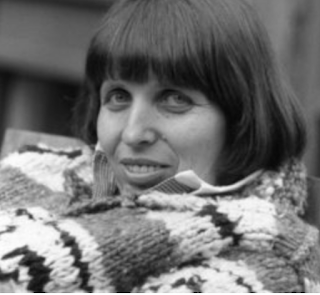
Scene: the Brookline High School Library, many plastic chairs set out in rows for this special event.
It was 1973 or 1974 and there was a poet in the library! Could you be alive and still be a poet? I remember thinking that she looked like she could be someone's mother (she was) and I'll admit, I was a little disappointed by this realization.
That is, until she started reading her poems.
I remember being amazed at how clear each poem appeared in the air, as in: shimmering with layers of nuance. Linda Pastan made it look so easy! I was sixteen years old and just beginning to consider poetry I might write (sadly, over my desire to be a novelist).
I met Linda Pastan again at the Breadloaf Writers Conference in 1993. Twenty years later I was still flirting with a life in poetry. She was the poet whom I asked to study with and she was the poet that I was lucky enough to meet one on one.
She also changed my life.But that's another story...
What I want to focus on for a moment is Pastan's incredible body of work. She has been publishing for over 50 years! When I look back at her poems, I see themes of the female body, of social anxiety, of grief, of a deep humor that are still alive and well today. However; Pastan was writing about "routine mammograms" and "an old woman" and "a visit to the gynecologist's" before these were cool subjects, before Sharon Olds....
I wonder why Pastan's poems are not as well known today as they once were. I keep coming back to her own self-deprecating humor and lack of need for a spotlight. Yet, when Linda Pastan came out to Seattle for the Seattle Arts and Lectures Series in 2015, already then in her early 80's, the theater was filed-up with love for this poet. If you are not familiar with her work, both the Academy of American and the Poetry Foundation can get you started. Pastan published Almost an Elegy last year, after 50+ years publishing, and over a dozen books, she still sounds pitch perfect to me, still writes with fresh energy and unflinching honesty.
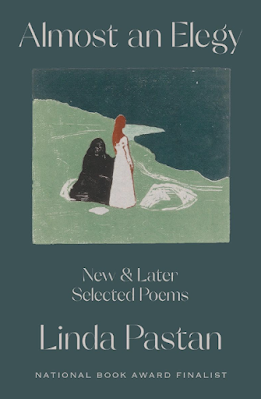
Traveling Light [image error] [image error] [image error] [image error] [image error] I'm only leaving you
for a handful of day
but it feels as though
I'll be gone forever—
the way the door closes
behind me with such solidity,
the way my suitcase
carries everything
I'd need for an eternity
of traveling light.
I've left my hotel number
on your desk, instructions
about the dog
and heating dinner. But
like the weather front
they warn is on its way
with its switchblades
of wind and ice,
our lives have minds
of their own.
Here is another one I am re-reading again and again, today.
A painter can say whatever he wants with fruits
or flowers, or even with clouds.
Edouard Manet
When I hand you this bowl
of apples, I mean:
here are some pink spheres of
love, or of lust – emblems
of all those moments after Eden
in which a hint of the forbidden was
like the seasoning of that first apple?
Or I just want to say: Forgive me,
I've been busy all day, and the only thing
for dessert is a piece of fruit.
And when you plucked
a single flower from the fading bush outside
our window,
were you telling me that I am somehow
like a flower, or worthy of flowers?
Were you telling me
something flowery,
or nothing more: here's the last rose
of November,
please put it in water?
But as for the clouds,
as for those.....To continue reading go to Poetry Foundation
January 14, 2023
Thinking about Charles Simic

I first met Charles Simic through his book, Dime-Store Alchemy, that gorgeous, gorgeous cover which lived in the window of the Grolier Poetry Bookshop. I walked by that cover every morning on my way to work. It was the early 90's and poetry was just beginning to be part of my world, before I'd decided to do an MFA, before I'd published my first book, before I could see a life in poetry. And though I didn't "understand" this book, I was obsessed.

I have bought this book several times as it seems to always be disappearing. In the early 90's, I had never seen a book with this color on the cover, I'd never read a prose poem, or heard of Joseph Cornell. This all seems impossible looking back, but this book was a unicorn. There was no other American surrealist that I had ever heard of and the ekphrastic tradition of poets finding inspiration in the visual arts, was, if not exactly frowned on, it certainly was not in vogue. I read and reread this book. I still do.
A friend of mine had a husband who had studied with Simic at the University of New Hampshire and adored him. This week's piece in The Yale Review by Megan O'Rourke gives a moving homage to her mentor, friend, and dinner companion. (You can find it here)
Oh, yes, and of course, Pulitzer Prize winning poet. I just found this video of Simic reading his poem "Stone" and for a moment, he comes alive again.
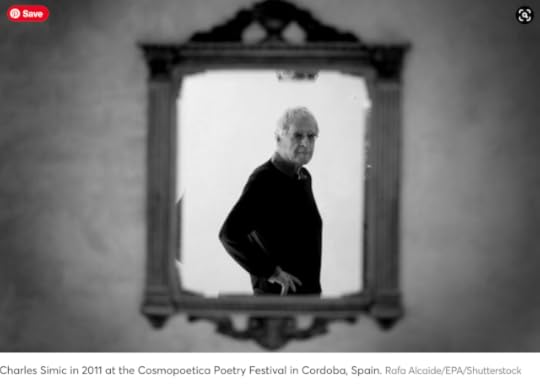
The great poets I grew up on: Elizabeth Bishop, Denise Levertov, Sylvia Plath, Adrienne Rich, Anne Sexton, Seamus Heaney, W.S. Merwin, Derek Walcott, and now, Charles Simic, are all gone now. The people, not the poems.
I did not know Charlie Simic the man who loved dessert enough to order all the desserts on the menu for a table of four. I didn't even know the term "surrealist" when I first encountered his work. I have been an admirer from afar.
"In the Library," is another of my favorite of his poems but I am discovering more favorites all the time.
For example, this haiku:
My Secret Identity
The room is empty
And the window is open
Solitude
There now, where the first crumb
Falls from the table
You think no one hears it.
As it hits the floor,
But somewhere already
The ants are putting on
their quaker hats
And setting out to visit you.
If you don't know the work of Charles Simic, checkout his work. Buy one of his many books. If you do know his work, give yourself the gift of getting reacquainted.
January 7, 2023
Easy and Quick Tips to Help Your Fellow Poet / Writer

I like to look at the positive side of life. Barack Obama said one of the things he learned early on the campaign travel is that most Americans are good. Let's extend that out to all people, globally. If we get the chance to do the right thing (and it's free and with little effort) we will do it.
So I'd like to start the new year right by being a better literary citizen. Here are the practices I want to do regularly and I invite you to join me!
1. Review your friends' poetry books --- and if you're in the mood --- include a photo as that will increase the chances that others will read it. Here's a review I did of my friend Kelli Russell Agodon's book, Dialogue with Rising Tides.
2. f you don't want to give attention to Amazon, (you can purchase the book anywhere) you can leave a review on GoodReads or on the site of your local independent bookstore. You can also leave a 5 star rating if you don't want to write a review. You need to set-up an account here, but it's free and a great way to keep track of your favorite authors. Actually, you can leave reviews at more than one place. The more reviews a book has, the more the magic algorithm will assure that book be shown to more people.
3. If you have a blog or a newsletter, (or a friend that likes to read!) you can mention your friend's new book. It's true that books are mostly sold by word of mouth. If you recommend a book of poems, even friends who don't often read poetry might buy a copy or take the book out of the local library. Even better, ask your local library to buy a copy! They will!
4. A personally signed copy of a book of poems is a great gift. Okay, this does cost money but you were going to buy your friend a birthday present anyway. Buying a signed copy of your friend's book to give to another friend is definitely a win-win situation.
5. Share a quick poem as a post on social media! If you are reading this, chances are you have a FB, Instagram, Ticktock, or Twitter account. Maybe all 4! It's super easy (and free) to post one of the poems from your friend's book. Just take a photo of the page (one page poems or shorter work best). I know I am always happiest when I start my day by reading a new poem.
Why not join me? These acts of kindness will make you feel all warm and fuzzy as well. I sincerely believe that as writers we raise ourselves up as we raise each other up. Of course we all would like more readers, more supporters, but we also feel best when we are helping others---especially the writers we know and love.
January 6, 2023
After 9 years, it is really here: DEMYSTIFYING THE MANUSCRIPT

It might not be polite to say so, but I just can't stop looking. The color, the hand, and the story it implies makes me ridiculously happy. Why this cover for this book? Creating a book of poems means knocking on a magical door---one where a beautiful hand can guide you through to the other side. You begin with a pile of poems and through the different chapters and interviews here, you learn a variety of ways to order that pile of chaos into a streamlined book with themes, braids, sections....there's many good choices.
A friend mentioned that for her, the cover image evokes questions: where does the poem live? Which poems live next door? What does the house of poetry feel like? Inside this book (with a door knocker from Turkey) is a chapter on choosing cover art. Kelli Russell Agodon and I created a Pinterest page to keep track of our favorite images in one place. Now it seems this blue door was inevitable all along.
The idea for the book began on a road trip from the Oregon Coast back-up to Seattle. We were returning from the Sylvia Beach Hotel where Poets on the Coast was held in the early years. Flash forward nine years and between us we have written over a dozen books including anthologies and individual collections of poems. We've also asked a wide selection of our favorite poets to join us which includes over 36 living poets. Our deep hope is to have the book out for AWP but the Two Sylvias Press offices are awaiting final confirmation. In the meantime, it is just now available here for pre-order.
January 3, 2023
My New Year's Resolution is to Write Poems and...
I love this time of year. Anything is possible and perhaps, even probable. There are all the poems in the world to write, and all the poems on the computer to send out to journals. This season of beginning fills me with optimism. And so, after an epidemic, a new book, and some epic times of wonder, I'm here again. Over the past few years, I've tried to balance more poetry writing with more poetry community.I know I need a vibrant and diverse group of poets around me. The classes I teach and the Poets on the Coast retreat I run are both for the poets that come to the events, but they also feed me. Something unexplicible happens when we write in community---as if the air we breathe is filled with even more poetry than usual. Somehow as a group, we are more than a sum of our parts. Or maybe it's something even simpler, when we share a safe and creative space, the poems come in new shapes and forms. We surprise ourselves. Register for Poets on the Coast now to reserve your place. Come write with us!
